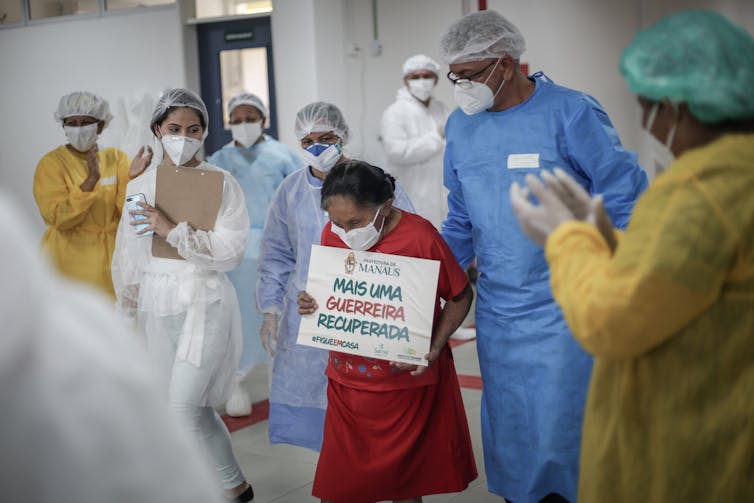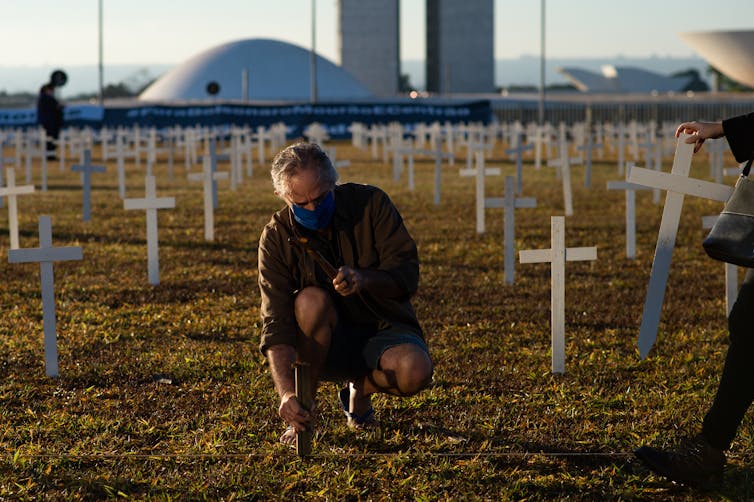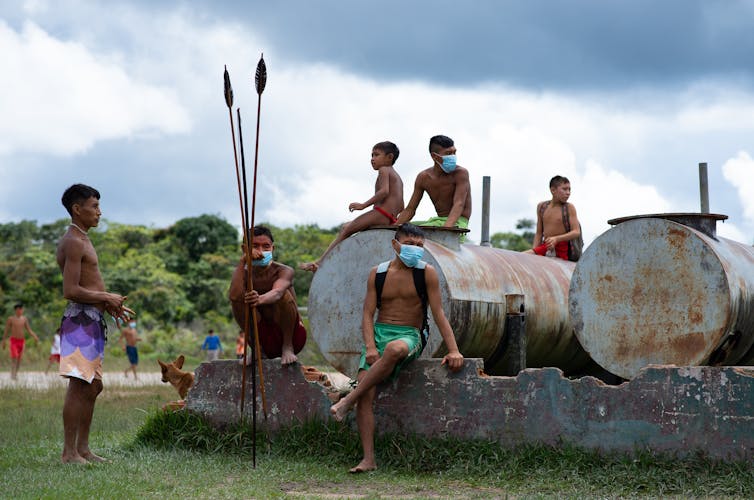Judge orders Brazil to protect Indigenous people from ravages of COVID-19
- Written by Nadia Rubaii, Co-Director, Institute for Genocide and Mass Atrocity Prevention, and Professor of Public Administration, Binghamton University, State University of New York
Brazil must take emergency measures to protect its Indigenous communities from the novel coronavirus, the Brazilian Supreme Court ruled on July 8.
Justice Luis Roberto Barroso gave the Brazilian government just three days to establish a crisis response team[1]. The team must get check points installed on Indigenous lands - with military support if necessary - to prevent outsiders from entering without permission and to test for COVID-19. Within a month, the government must issue a comprehensive pandemic plan to stop trespassing on Indigenous territory – which potentially exposes residents to the virus – and provide health care for all Indigenous peoples.
The order responded to a June 29 petition[2] filed by a Brazilian indigenous rights organization and six political parties asserting that COVID-19 could lead to a “genocide[3]” of Brazil’s already at-risk Indigenous population.
Data from the pandemic shows that Indigenous Brazilians are getting sick and dying[4] at higher rates than the general population. Most of Brazil’s roughly 896,000 Indigenous people live in the Amazon region[5], where the nearest hospital may be days away by boat and offer limited care[6]. Indigenous Brazilians also have high rates of malnutrition, anemia and obesity[7] - risk factors for severe COVID-19.
As of July 8, Brazil’s Health Ministry reported 8,098 COVID-19 infections among Indigenous people and 184 deaths[8]. The National Committee for Indigenous Life and Memory[9], an advocacy group for Indigenous people during the pandemic, estimates more than 12,000 infections and 446 deaths[10].
For Native communities with just a few hundred or thousand members[11], that’s an existential threat. At current rates of infection, 5,600 Indigenous Yanomami people – or 40% of their entire population – could get COVID-19[12], according to Brazil’s Indigenous Environmental Institute.
 A 92-year-old Baniwa Indigenous patient leaves the COVID-19 field hospital in the Amazonian city of Manaus in May 2020, holding a sign reading ‘Another Recovered Warrior.’
Andre Coelho/Getty Images[13]
A 92-year-old Baniwa Indigenous patient leaves the COVID-19 field hospital in the Amazonian city of Manaus in May 2020, holding a sign reading ‘Another Recovered Warrior.’
Andre Coelho/Getty Images[13]
What is genocide
Brazil’s uncontained coronavirus outbreak is just the latest deadly threat to Indigenous people under President Jair Bolsonaro, who recently tested positive for COVID-19[14].
Since taking office in January 2018, Bolsonaro has dismantled environmental protections for the Amazon[15], allowing deforestation and wildfires[16] to spike. He has also curtailed the land rights of Indigenous people and turned a blind eye to illegal mining, logging and farming operations on their territory.
The president’s policies and rhetoric toward Indigenous Brazilians are so hostile that they essentially amount to an extermination campaign, our research finds. In late 2019, two leading Brazilian human rights organizations argued to the International Criminal Court[17] of the United Nations that the right-wing leader was “inciting genocide” against Indigenous people.
That case is still pending, but under international law, the crime of genocide[18] requires “intent to destroy, in whole or in part,” a group based on their nationality, ethnicity, race or religion – not explicit mass killing. Causing serious harm to a population and destroying their way of life can constitute genocide.
[Deep knowledge, daily. Sign up for The Conversation’s newsletter[19].]
As scholars of mass atrocity prevention[20] and Indigenous rights, we have watched with alarm the warning signs[21] that a slow genocide was underway in Bolsonaro’s Brazil. Then came COVID-19, which is killing Indigenous people by the hundreds.
 A protest demonstration honoring Brazilian COVID-19 victims in the capital of Brasilia, June 28, 2020.
Andressa Anholete/Getty Images[22]
A protest demonstration honoring Brazilian COVID-19 victims in the capital of Brasilia, June 28, 2020.
Andressa Anholete/Getty Images[22]
Warning signs
In theory, many Brazilian Indigenous people should be able to escape COVID-19 exposure. An estimated 10,000[23] live in voluntary isolation[24] across the Amazon, separated from broader Brazilian society. Many others have only limited contact with the outside world.
Their rights to self-determination and isolation are confirmed by two international agreements[25] on indigenous rights[26], both of which Brazil signed. In recent years, however, loggers, miners and farmers[27] have aggressively violated these land rights and begun operating in the Amazon, sometimes with the Bolsonaro government’s explicit endorsement[28].
The illegal land grabs have worsened during the pandemic[29], as the world’s attention turned away from the Amazon. The number of non-Indigenous gold miners working on Indigenous lands in Brazil increased from 4,000 in 2018 to over 20,000 so far in 2020[30].
Beyond bringing the coronavirus into isolated communities, such incursions endanger the very survival of Indigenous Brazilians.
Indigenous people have lived in the Amazon for centuries, protecting the rainforest[31] in a manner that not only supported their traditional way of life but also protected this global natural resource. Historically, they could count on at least minimal government regulations intended to defend the Amazon rainforest, though deforestation has long been a challenge[32].
Bolsonaro does not believe in defending the Amazon or its inhabitants[33]. One of his first acts in office was to slash environmental protections. Deforestation of the Amazon has increased 34%[34] since 2018, according to the Brazilian Amazon monitoring program[35]. On Indigenous lands it is up almost 80%.
Illegal property seizure[36] and rights violations like those experienced by Indigenous Brazilians are known warning signs of genocide. So is the physical destruction of a persecuted group’s homeland. According to the UN, “deliberately inflicting on the group conditions of life calculated to bring about its physical destruction in whole or in part[37]” constitutes genocide.
 Yanomami Indigenous Brazilians wait to receive health care from missionaries in Roraima state, July 1, 2020.
Andressa Anholete / Getty Images[38]
Yanomami Indigenous Brazilians wait to receive health care from missionaries in Roraima state, July 1, 2020.
Andressa Anholete / Getty Images[38]
Denying the humanity of a group[39] is another frequent precursor to genocide, history shows. Before the Holocaust, for example, Nazis referred to Jews as rats.
Bolsonaro has not gone so far as to characterize Indigenous Brazilians as vermin. But he refers to them using derogatory language.
“The Indians do not speak our language, they do not have money, they do not have culture,” he told Campo Grande newspaper in 2015[40], when he was still a congressman. Earlier this year, Bolsonaro said Indigenous people exposed to the outside world are “increasingly becoming human beings, like us[41].”
A preventable atrocity
Land grabs, insufficient health care, deforestation and stigmatization all threatened Indigenous Brazilians before the pandemic. Genocides can happen that way: They are processes[42], not sudden, isolated events. Risk factors and warning signs can smolder for years in a country. Then a “trigger[43]” like COVID-19 ignites them, resulting in mass death.
The Supreme Court’s 40-plus page emergency ruling[44] makes no mention of genocide. However, its quick issuance and strict deadlines acknowledge the urgency of the situation facing Brazil.
Compliance is not guaranteed. The Bolsonaro administration has ignored past court rulings related to Indigenous rights, with only occasional fines as a consequence.
But by ordering emergency protections, Justice Barroso demonstrated that at least one branch of Brazil’s government accepts its responsibility to protect[45] its people - all of them - from a preventable atrocity.
This is an updated version of an article first published on July 7[46].
References
- ^ gave the Brazilian government just three days to establish a crisis response team (stf.jus.br)
- ^ petition (www.jota.info)
- ^ genocide (www.jota.info)
- ^ getting sick and dying (ipam.org.br)
- ^ 896,000 Indigenous people live in the Amazon region (www.funai.gov.br)
- ^ limited care (www.scielo.br)
- ^ high rates of malnutrition, anemia and obesity (www.scielo.br)
- ^ 8,098 COVID-19 infections among Indigenous people and 184 deaths (saudeindigena.saude.gov.br)
- ^ National Committee for Indigenous Life and Memory (www.nationalgeographic.com)
- ^ 12,000 infections and 446 deaths (covid19.socioambiental.org)
- ^ with just a few hundred or thousand members (www.survivalinternational.org)
- ^ could get COVID-19 (acervo.socioambiental.org)
- ^ Andre Coelho/Getty Images (www.gettyimages.com)
- ^ recently tested positive for COVID-19 (theconversation.com)
- ^ dismantled environmental protections for the Amazon (theconversation.com)
- ^ deforestation and wildfires (theconversation.com)
- ^ argued to the International Criminal Court (apublica.org)
- ^ the crime of genocide (www.un.org)
- ^ Sign up for The Conversation’s newsletter (theconversation.com)
- ^ mass atrocity prevention (www.un.org)
- ^ warning signs (academic.oup.com)
- ^ Andressa Anholete/Getty Images (www.gettyimages.com)
- ^ 10,000 (unpo.org)
- ^ voluntary isolation (www.oas.org)
- ^ international agreements (www.un.org)
- ^ indigenous rights (www.oas.org)
- ^ loggers, miners and farmers (theconversation.com)
- ^ Bolsonaro government’s explicit endorsement (theconversation.com)
- ^ worsened during the pandemic (theconversation.com)
- ^ 4,000 in 2018 to over 20,000 so far in 2020 (news.mongabay.com)
- ^ protecting the rainforest (theconversation.com)
- ^ long been a challenge (www.vox.com)
- ^ does not believe in defending the Amazon or its inhabitants (theconversation.com)
- ^ Deforestation of the Amazon has increased 34% (g1.globo.com)
- ^ Brazilian Amazon monitoring program (www.obt.inpe.br)
- ^ Illegal property seizure (www.scielo.br)
- ^ deliberately inflicting on the group conditions of life calculated to bring about its physical destruction in whole or in part (www.un.org)
- ^ Andressa Anholete / Getty Images (www.gettyimages.com)
- ^ Denying the humanity of a group (www.genocidewatch.com)
- ^ Campo Grande newspaper in 2015 (www.campograndenews.com.br)
- ^ increasingly becoming human beings, like us (www.theguardian.com)
- ^ processes (www.ushmm.org)
- ^ trigger (core.ac.uk)
- ^ 40-plus page emergency ruling (www.stf.jus.br)
- ^ responsibility to protect (www.un.org)
- ^ article first published on July 7 (theconversation.com)
Authors: Nadia Rubaii, Co-Director, Institute for Genocide and Mass Atrocity Prevention, and Professor of Public Administration, Binghamton University, State University of New York

